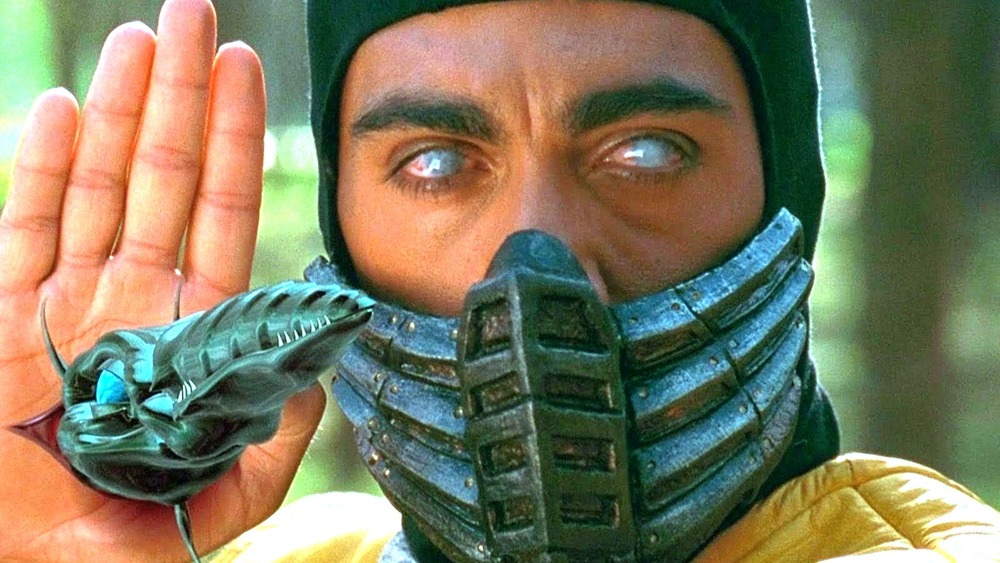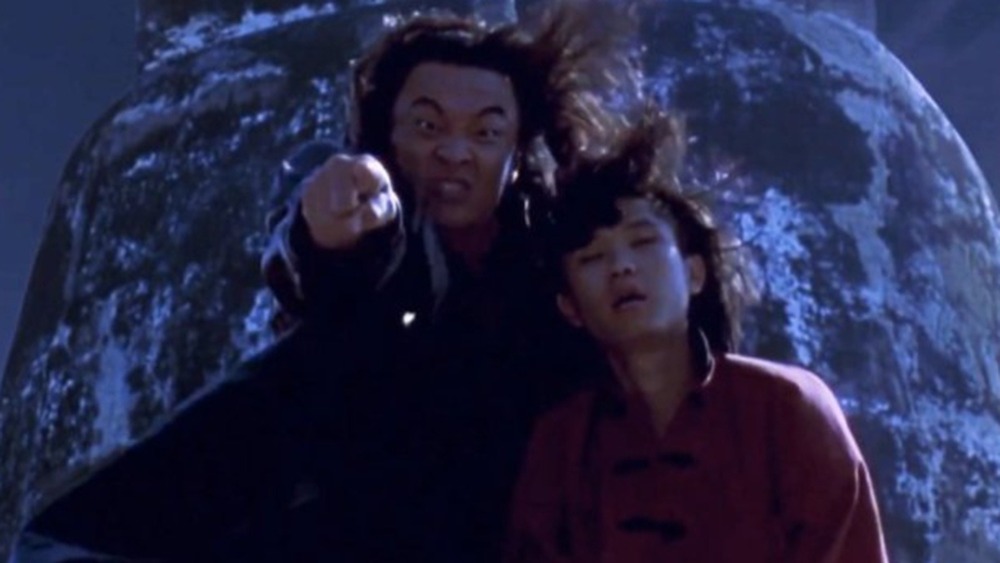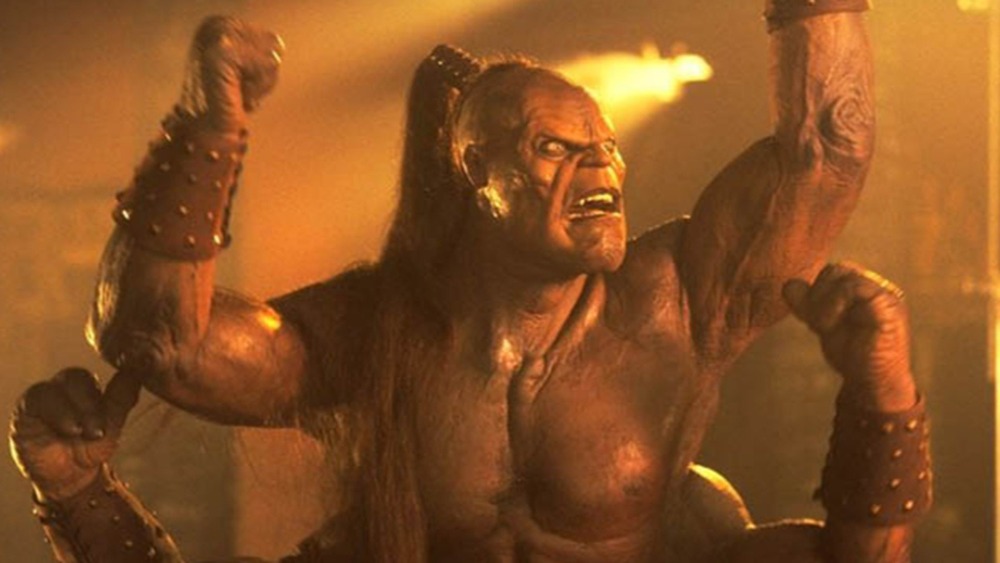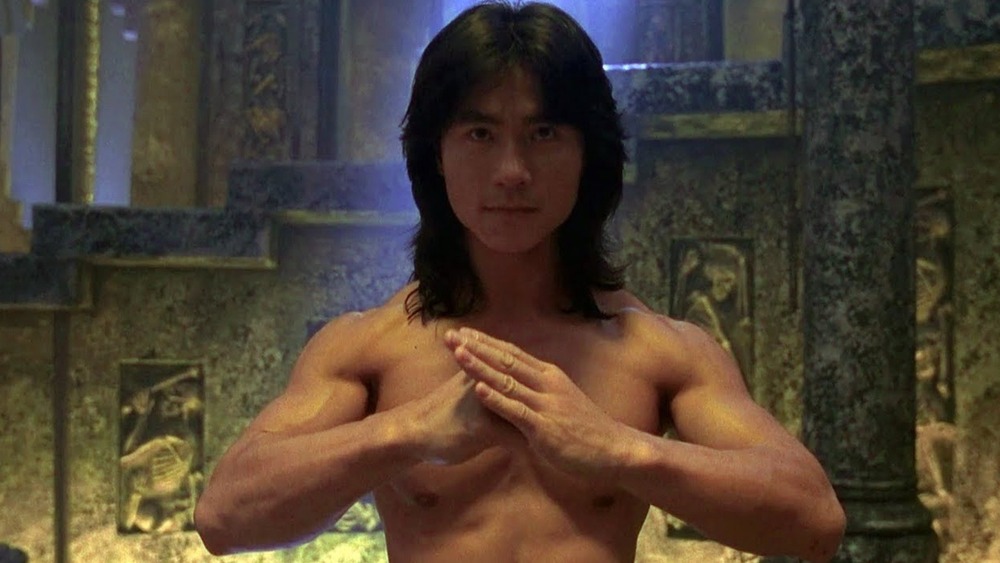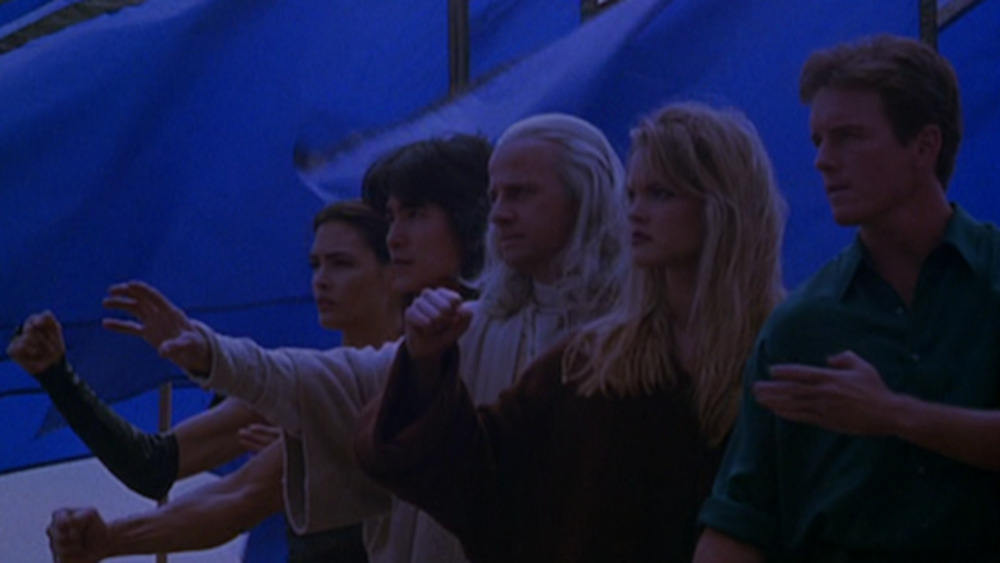The Ending Of 1995's Mortal Kombat Explained
It's no secret that video game-based movies have quite a negative stigma surrounding them. With the attempts like strange Super Mario Bros. adaptation from 1993 and the hit-or-miss Resident Evil films dominating the conversation, it has been an uphill battle getting studios and moviegoers to take the genre seriously. Thankfully, it appears 2021's Mortal Kombat from director Simon McQuoid, which arrives on HBO Max on April 23, will be an exception. As evidenced by the initial trailer alone, the project promises to stay relatively faithful to the source material despite bringing its story and gameplay style into a vastly different medium.
While there's plenty of reason to be excited about the upcoming MK feature, it's worth remembering that it's not the first attempt to bring the series to film. 1995 saw the arrival of Paul W.S. Anderson's Mortal Kombat on the big screen, capitalizing on the popularity of the first few video games. It served as the live-action introduction for names like Liu Kang (Robin Shou) and Shang Tsung (Cary-Hiroyuki Tagawa), and locations such as Outworld and Goro's (Tom Woodruff Jr./Kevin Michael Richardson) Lair. Not to mention, it brought all of the martial arts action of the games along with it, ensuring viewers didn't have to endure a single dull moment.
Even still, from a 2021 perspective, the first Mortal Kombat flick is pretty dated and not everyone's cup of tea. But, for those who enjoy this kind of unapologetic 90s silliness, here's how the story ends and what took place to create that conclusion.
Personal motives
Mortal Kombat wastes little time introducing the heroes to the audience, and their various reasons for participating in Shang Tsung's Mortal Kombat tournament. Liu Kang is first on the list, shown suffering from a nightmare that depicts Tsung killing his younger brother, Chan (Steven Ho). Even though his Shaolin monk family tries to dissuade him, he's driven to sign up for the competition and exact revenge on Tsung for his evil act.
Moments later, fan-favorite Sonya Blade (Bridgette Wilson) takes center-stage as a tough-as-nails military leader. Flanked by fellow MK mainstay Jax Briggs (Gregory McKinney), she's hot on the trail of her longtime adversary and the man responsible for murdering her former partner, Kano (Trevor Goddard). What she and her team don't know is that the Australian cyborg is in league with Shang Tsung, who has a hidden agenda that requires Sonya's involvement in his tournament.
Finally, actor Johnny Cage (Linden Ashby) enters the fray, and his career isn't doing so hot. Even though he's still getting work as an action star and his name is all over the media, it's not necessarily for good reasons. He has been labeled a fraud whose martial arts skills are a complete fabrication. When offered the chance to join the Mortal Kombat tournament by his sensei, Boyd (Peter Jason) — who is actually Shang Tsung in disguise — he sees it as the chance to legitimize himself in the eyes of the critics once again.
On their way to Shang Tsung's island, Lord Raiden (portrayed by Highlander star Christopher Lambert) cues them into what's really going on. He explains that the Mortal Kombat tournament has been won by Outworld for nine consecutive years, and if they win again they'll launch a full-on invasion of Earthrealm. With this in mind, the heroes' desire to win became all the more intense.
Very sore losers
As the title implies, Mortal Kombat is a property that has built a name off of physical confrontation. With each passing video game installment, the series has grown more gruesome yet creative with its action thanks to the ever-improving capabilities of home consoles. Although for the PG-13 rating attached to his 1995 film, Paul W.S. Anderson had to keep the gore to a minimum, but that doesn't mean that there weren't some nasty deaths along the way.
The first major one comes thanks to Sonya Blade, who otherwise doesn't see much combat against named MK characters. She engages her rival Kano in a back-and-forth battle as part of the tournament early on in the movie. He puts up a good fight, but she takes the victory by breaking his neck. Johnny Cage then takes on one of Shang Tsung's deadly enforcers, Scorpion (Chris Casamassa/Ed Boon), who he lights on fire, prompting his head then body to explode. Cage also takes out Prince Goro with a big punch below the belt and a series of strikes that send the four-armed combatant hurdling off a cliff.
Not to be left out, Liu Kang took on a couple of Shang Tsung's cronies too, the first being Sub-Zero (François Petit). The iconic characters clashed before Kang recalled the advice of the mysterious Kitana (Talisa Soto), who told him "Use the element which brings life." He then sent a bucket of water hurdling at the ice-manifesting Sub-Zero, which froze in midair and impaled him. Shortly after, Liu Kang faced the villainous Reptile (Keith Cooke/Frank Welker) who finally took the human form he dons in the game after spending much of his screen time as a CGI lizard-creature. Using his famed bicycle kicks, Kang takes down Tsung's spy, squashing him underfoot once he returned to his reptile form.
Winner: Liu Kang
In the closing moments of the film, Sonya Blade is captured by Shang Tsung and brought to Outworld, leading Liu Kang and Johnny Cage to pursue. They find her and the evil sorcerer, who challenges Cage in hopes of an easy victory. Instead, Kang steps up to the plate and vows to stop Tsung once and for all. They trade punches and kicks for a time, and Tsung even manifests his captured souls of fallen warriors to fight in his place, but Kang is undeterred. Even when Tsung shapeshifts into Chan, hoping to throw Kang off of his game, he's unsuccessful.
Liu Kang ultimately defeats his adversary, kicking him over a ledge and onto the spiked floor below. This freed Blade and the souls of those who Shang Tsung never allowed to pass on, including Chan. In a genuinely emotional moment, he says goodbye to his brother, for the time being, promising to reunite with him in the future. With that, every one of Mortal Kombat's heroes accomplished their mission, and then some. Blade ended Kano's reign of terror and avenged her friend's death, Cage got his mojo back as a bonafide martial artist, Kang made good on his promise to put an end to Shang Tsung, and together they saved Earthrealm from Outworld's invasion...or so they thought.
Round 2, FIGHT!
Celebration ensues once word of Shang Tsung's defeat spreads across the land. Standing tall, Johnny Cage, Sonya Blade, Liu Kang, and Kitana reunite with Raiden and reflect on their successful defense of Earthrealm. However, their smiles don't last long, as the sky fills with dark clouds and panic quickly spreads among the parading masses. The huge, foreboding image of Outworld's emperor and Kitana's adoptive father, Shao Kahn (voiced by Frank Welker) emerges high above and destroys Tsung's island fortress. He declares he'll take their souls, but with Raiden's emphatic "I don't think so," Earthrealm's defenders prepare for another battle.
This confrontation came two years later in 1997's Mortal Kombat: Annihilation, where Kahn's Outworld armies attempt a takeover of Earthrealm. Luckily, much like Shang Tsung, they fail to stop Earth's heroes and are incapable of staging a successful takeover. That's how this particular MK continuity ends, as Annihilation performed so poorly with critics and at the box office that a planned third chapter quickly wound up in the scrap pile. Be that as it may, this continuation has its merits, including the arrival of combatants such as Baraka (Dennis Keiffer), Sindel (Musetta Vander), Nightwolf (Gary "Litefoot" Davis), and more to the cinema.
Even though both Mortal Kombat and its sequel are far from perfect, they boldly went where no film had gone before, and paved the way for the 2021 reboot that most agree looks far more promising.
